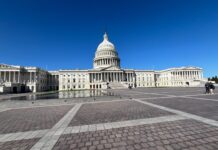
(GA Recorder) – A bill expanding gun rights protections in Georgia is heading back to the House after it passed the state Senate Monday with an amendment further limiting the governor’s powers during states of emergency.
When it passed the House last week, the bill had language preventing the governor from blocking gun or ammunition manufacture or sales, suspending or revoking gun licenses, refusing to accept an application, or single out gun stores or shooting ranges for closure during a state of emergency. State law already bars a governor from prohibiting possession of firearms or ammunition during emergencies.
An amendment added by Dallas Republican Sen. Jason Anavitarte contains new language, further limiting the governor’s power to limit religious practices or shut down businesses during future health states of emergency.
Last March, state lawmakers granted Gov. Brian Kemp expanded public health emergency powers as the state launched a fight against COVID-19. Gov. Brian Kemp’s April 2 statewide shelter-in-place order banned gatherings of 10 or more people. “This rule applies to church services and funeral services,” the governor’s office said in an FAQ attached to the order.
The order came after church services played host to some of the state’s earliest super spreader events, but it caused anguish when Easter services were moved online and grieving loved ones were forced to watch funerals through car windows. Houses of worship were among the first establishments to reopen in Georgia.
The amendment to the gun bill also states that any business or organization “may operate if the organization complies with all applicable health and safety contained” in the governor’s order.
Sen. Michelle Au, an Atlanta Democrat, questioned the wisdom of restricting a governor’s response to an unforeseen emergency.
“Isn’t it true that during a state of emergency, the focus should really be on public safety, not curtailing the governor’s powers, or stymieing the effectiveness of local law enforcement?” she said. “Isn’t it also true that firearms don’t make people safer during a pandemic and that restricting the governor’s ability to close or limit gun store operations puts their owners and customers at risk?”
The bulk of the bill still proposes expanded gun rights even without a state of emergency.
“This is a Second Amendment protection bill that further recognizes Georgia’s commitment to protect its citizens and their Second Amendment rights,” said Sen. Bo Hatchett, the Cornelia Republican who carried the bill in the Senate.
If Kemp signs the legislation, Georgia will honor concealed carry licenses from any other state, rather than only those from states that have specific agreements with Georgia.
The bill also authorizes probate court judges to create online application processes for weapons carry licenses and renewals. It restricts the creation of multijurisdictional databases of people who have applied for weapons licenses and directs law enforcement agencies to hold auctions of confiscated firearms at least once per year.
In opposing the measure, Democrats pointed to the recent spa shootings in Atlanta and Cherokee County, the Boulder, Colo. grocery store attack, and other mass shootings around the country.
“We don’t have to live like this,” said Sen. Elena Parent, an Atlanta Democrat. “We don’t have to see three establishments shot up and eight people dead in our state to be followed six days later by 10 more people dead. We don’t have to live in fear of the next mass shooting. We don’t have to bear this huge number of grieving families. Americans aren’t more violent than other human beings. Second Amendment rights are great, but we need to also talk about saving lives.”
Parent called for more research on gun violence and prevention.
Gun safety groups have questioned the optics of loosening gun restrictions in the wake of this month’s killing spree.
“Especially in this moment, lawmakers should be strengthening our gun laws, not weakening them further,” said Emma Jones, a volunteer with the Georgia chapter of Moms Demand Action after the bill passed the House.
Jones said her group is backing legislation Democrats are hoping will gain support between this year’s legislative session’s end on Wednesday and next year’s session that begins in January, including a bill sponsored by Au to mandate a five-day waiting period for gun purchases.
Au said such legislation would reduce daily shootings and suicides that account for more gun deaths than attention-grabbing mass shootings.
“During the pandemic, we saw increased risk of domestic violence and suicide as tracked by hotlines around the country that had increased volume by 300%,” she said. “How does this bill make people safer?”
Gun rights are among the top concerns of Republican voters and lawmakers, and any gun control legislation is likely to face stiff opposition from Republicans next year.
Senate Majority Leader Mike Dugan, a Carrollton Republican, said gun-control laws will not prevent mass shootings, offering the example of the Clinton-era Brady bill.
“Everybody at the time thought it was a very well-intentioned bill,” he said. “Unfortunately, the first mass shooting in a school happened during the time of the Brady Bill. So I guess where I’m going on this is that limitations don’t stop this. There are other issues out there, would you not agree, that we need to address.”
Sen. Carden Summers questioned whether more gun ownership might reduce mass shootings, giving the example of the 2012 Aurora, Colorado movie theater shooting.
“In that theater, where the people were killed, isn’t it true that if one person in that theater that was carrying or had a gun on them at that time, a legal gun, on them at that time, had fired back at the assailant, that might have saved lives and stopped the shooting?” he said.







